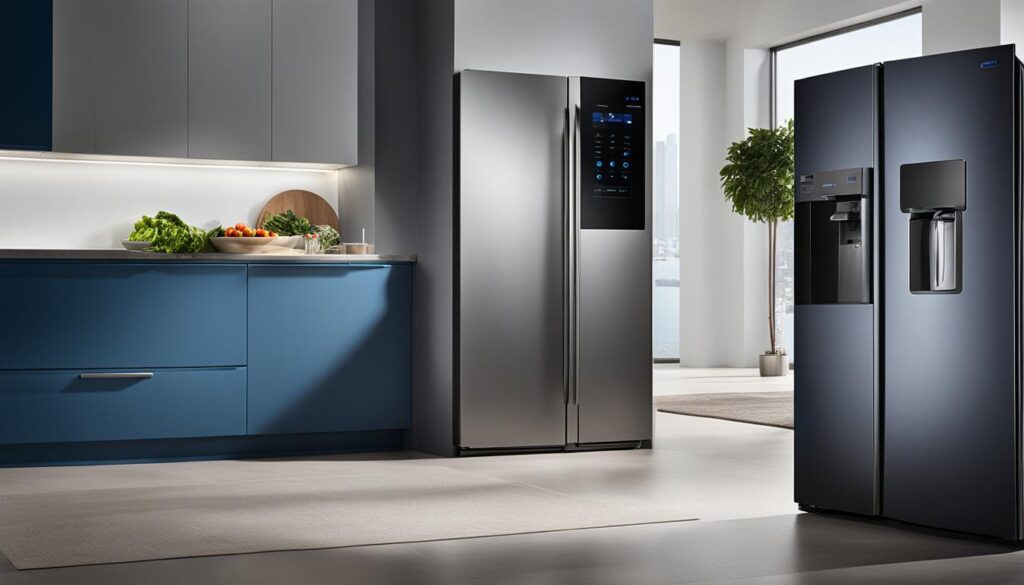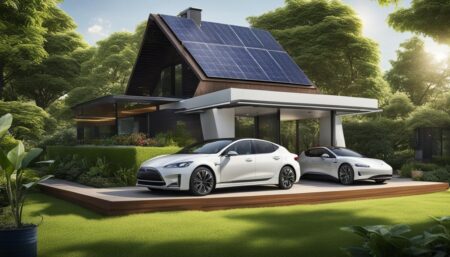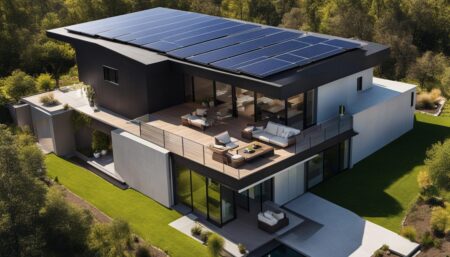Choosing energy-efficient home appliances can help cut costs and promote sustainable living. In 2024, the top-rated appliances to consider include energy-efficient smart refrigerators, multi-functional air fryer ovens, high-efficiency washing machines, smart robotic vacuum cleaners, and voice-controlled smart ovens. These appliances offer advanced features, convenience, and energy-saving capabilities.
Key Takeaways:
- Investing in energy-efficient appliances can lead to lower electricity bills and promote sustainable living.
- The top-rated energy-efficient home appliances for 2024 include smart refrigerators, air fryer ovens, washing machines, robotic vacuum cleaners, and voice-controlled ovens.
- These appliances offer advanced features, convenience, and energy-saving capabilities.
- By choosing energy-efficient appliances, you can reduce your carbon footprint and contribute to a greener future.
- Considered alternatives to conventional appliances, energy-efficient options can help you save money while supporting sustainability.
Energy-Efficient Smart Refrigerators
In 2024, energy-efficient smart refrigerators are at the forefront of home appliance technology. These cutting-edge refrigerators offer advanced features that not only provide convenience but also contribute to energy savings and sustainability. With their adjustable temperature zones, remote monitoring capabilities, and energy-saving modes, these refrigerators are revolutionizing the way we store and preserve food.
One of the key features of energy-efficient smart refrigerators is their ability to adjust temperature zones. This allows you to create separate compartments with different temperature settings, ensuring optimal storage conditions for different types of food. Whether you need to keep your fruits and vegetables fresh or chill your beverages at the perfect temperature, these adjustable zones cater to your specific needs.
“With adjustable temperature zones, energy-efficient smart refrigerators offer optimal storage conditions for different types of food.”
Remote monitoring is another remarkable feature of these refrigerators. Through smartphone apps, you can remotely access and control your refrigerator settings, receive maintenance alerts, and even view the contents of your fridge. This level of convenience not only saves you time but also helps prevent food waste by allowing you to monitor expiry dates and plan your meals effectively.
Energy-saving modes are a valuable advantage of energy-efficient smart refrigerators. These modes optimize energy usage by adjusting cooling settings based on usage patterns and climate conditions. By reducing unnecessary energy consumption, these refrigerators contribute to lower energy bills and a smaller carbon footprint.
Investing in an energy-efficient smart refrigerator not only brings value to your daily life but also promotes sustainability. By reducing energy consumption and minimizing food waste, these appliances play a significant role in lowering your carbon footprint. Additionally, the long-term energy savings translate into cost savings on your monthly energy bills, making these refrigerators a wise and eco-friendly investment.
| Benefits of Energy-Efficient Smart Refrigerators |
|---|
| Adjustable temperature zones |
| Remote monitoring capabilities |
| Energy-saving modes |
| Reduces carbon footprint |
| Saves on energy bills |
| Value and sustainability |
Multi-functional Air Fryer Ovens
Air fryer ovens have become an increasingly popular choice for those seeking a healthier alternative to traditional frying methods. In 2024, these versatile appliances have evolved to offer a range of functions beyond air frying, including baking, grilling, and dehydrating.
One of the key advantages of multi-functional air fryer ovens is their ability to save kitchen space by replacing multiple cooking appliances. With the versatility to handle various cooking tasks, these appliances streamline your cooking process and eliminate the need for separate appliances for different functions.
But it’s not just about convenience. Air fryer ovens also boast smart features that enhance the cooking experience. Many models come equipped with preset cooking programs, allowing you to easily achieve the perfect results for different dishes. Additionally, voice-assistant compatibility provides hands-free control, adding an extra layer of convenience to your culinary endeavors.
Another major benefit of multi-functional air fryer ovens is their energy efficiency. These appliances are designed to cook food faster and more efficiently compared to conventional ovens, resulting in lower electricity consumption. By harnessing the power of rapid air circulation and precise temperature control, these ovens deliver tasty results while saving energy.
With a multi-functional air fryer oven, you can enjoy the crispy goodness of air frying, explore your creativity in baking and grilling, and experiment with dehydrating fruits and vegetables. The possibilities are endless, offering both culinary versatility and a healthier cooking alternative.
“Multi-functional air fryer ovens offer a healthier way to indulge in your favorite fried treats, while also expanding your culinary horizons.”
The Benefits of Multi-functional Air Fryer Ovens:
- Healthier alternative to traditional frying methods
- Versatility for baking, grilling, and dehydrating
- Saves kitchen space and reduces the need for multiple appliances
- Smart features like preset cooking programs and voice-assistant compatibility
- Energy-efficient cooking with faster cooking times and lower electricity consumption
| Function | Features |
|---|---|
| Air frying | Rapid air circulation for crispy results with less oil |
| Baking | Precise temperature control for perfectly baked goods |
| Grilling | Even heat distribution for delicious grilled dishes |
| Dehydrating | Dries fruits, vegetables, and herbs for long-lasting preservation |
With multi-functional air fryer ovens, you can enjoy the convenience of a versatile cooking appliance that not only promotes healthier cooking but also saves space, time, and energy. Upgrade your kitchen with this efficient and innovative cooking solution.
High-Efficiency Washing Machines
The new generation of high-efficiency washing machines offers a range of features designed to reduce water and energy use, while providing efficient and convenient laundry solutions. These advanced machines incorporate innovative technologies to enhance performance and sustainability.
Load-Sensing Technologies
Smart Robotic Vacuum Cleaners
In 2024, smart robotic vacuum cleaners have become a game-changer in household cleanliness. These intelligent devices not only take care of vacuuming but also offer mopping capabilities, revolutionizing the way we keep our floors spotless. With advanced navigation systems, these robotic cleaners can efficiently navigate and map your home, ensuring every corner is cleaned with precision and accuracy.
Equipped with state-of-the-art features, smart robotic vacuum cleaners have made household chores a breeze. Voice control technology allows you to effortlessly command your robot cleaner, making it a convenient hands-free solution for busy individuals. You can even schedule cleaning sessions based on your preferences, thanks to programmable schedules that ensure your floors are maintained regularly.
These smart robotic vacuum cleaners are designed to integrate seamlessly with your smart home, offering compatibility with popular home automation systems. This means you can control and manage your vacuum cleaner through voice commands or smartphone apps, giving you full control from anywhere in the house.
With their advanced sensors and algorithms, these robotic cleaners adapt to different floor surfaces, adjusting suction power and cleaning patterns accordingly. Whether you have carpeted areas or hardwood floors, these intelligent devices guarantee a thorough clean every time.
| Features | Benefits |
|---|---|
| Advanced navigation systems | Efficient cleaning patterns and thorough coverage |
| Voice control | Convenient hands-free operation |
| Programmable schedules | Set and forget cleaning sessions |
| Smart home compatibility | Integration with home automation systems |
| Mopping capabilities | Efficiently vacuum and mop for spotless floors |
Investing in a smart robotic vacuum cleaner not only saves you the time and effort of manual vacuuming but also ensures your floors are consistently cleaned, promoting a healthier living environment. With their convenience, efficiency, and compatibility with modern smart homes, these intelligent devices are the perfect addition to any household.
Voice-Controlled Smart Ovens
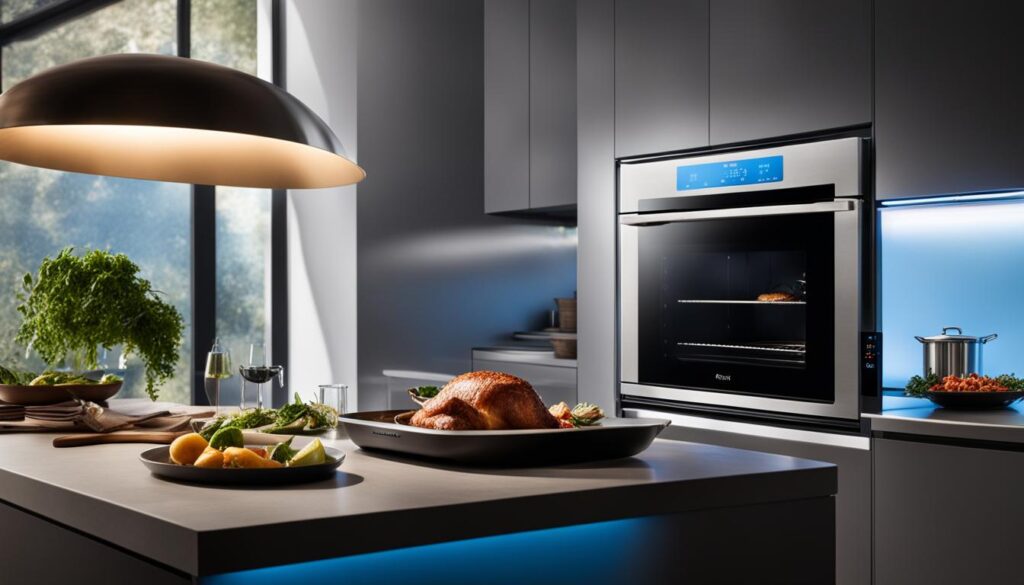
Voice-controlled smart ovens are revolutionizing the way we cook. With their advanced features and convenience, these ovens make culinary tasks easier than ever before. By integrating voice commands and smartphone apps, they offer a seamless cooking experience that caters to your every need.
One of the standout features of voice-controlled smart ovens is remote preheating. Imagine being able to preheat your oven on your way home from work, ensuring it’s ready to go as soon as you step through the door. Whether you’re in a rush or simply want to save time, this feature brings a new level of convenience to your kitchen.
Temperature control is another key advantage of these ovens. With precision and accuracy, you can easily set and adjust the temperature to achieve your desired cooking results. Whether it’s baking a delicate soufflé or roasting a juicy turkey, the temperature control feature ensures your dishes are cooked to perfection.
Cooking notifications are a game-changer for busy individuals. These smart ovens can send notifications to your smartphone, letting you know when your food is ready or when it’s time to check on its progress. No more guessing or constantly monitoring the timer – simply rely on the oven to keep you informed.
For those who enjoy visual monitoring, some models even come with built-in cameras. These cameras allow you to see your food without opening the oven door, minimizing heat loss and preserving the cooking environment. Whether you want to check on the browning of your casserole or monitor the rise of your bread, these built-in cameras offer a new level of convenience.
Voice-controlled smart ovens also come with a variety of cooking modes to suit your every culinary need. Whether you’re in the mood for baking, broiling, roasting, or even air frying, these ovens have you covered. With just a simple voice command, you can select the cooking mode that best suits your recipe.
| Oven Brand | Key Features | Price Range |
|---|---|---|
| Brand A | Voice commands, remote preheating, built-in camera, multiple cooking modes | $1,000-$1,500 |
| Brand B | Voice commands, temperature control, cooking notifications, energy-saving mode | $1,500-$2,000 |
| Brand C | Voice commands, built-in recipes, self-cleaning function, touch screen display | $2,000-$2,500 |
Table Caption: Comparison of Voice-Controlled Smart Ovens from leading brands.
With their advanced features and convenience, voice-controlled smart ovens are a must-have for any modern kitchen. Whether you’re a seasoned chef or an amateur cook, these ovens offer unparalleled functionality and ease of use. Embrace the future of cooking and experience the convenience of voice control in your kitchen today!
Saving Money with Energy Efficiency
Embracing energy efficiency can lead to significant cost savings. By upgrading to energy-efficient appliances and making simple changes in your home, you can not only save money but also contribute to a greener future.
Lower Electricity Costs
One way to save money is by investing in energy-efficient appliances. For example, consider installing a heat pump, which uses less energy compared to traditional heating and cooling systems. This can result in substantial savings on your monthly energy bills.
Another easy change you can make is to switch to energy-efficient lightbulbs. These bulbs use less electricity and last longer, meaning you’ll save money on replacement costs and reduce your overall energy usage.
Smart Thermostats for Energy Savings
Installing a smart thermostat is another excellent choice for energy efficiency. These devices allow you to program and control the temperature of your home, so you can optimize your energy usage. Smart thermostats can save approximately 10% in annual energy costs.
Air-Source Heat Pumps and Tax Credits
Air-source heat pumps are highly efficient at heating and cooling your home. They use the outside air to regulate the temperature indoors, reducing your reliance on electricity or fossil fuels. These pumps can lower your heating and cooling electricity usage by nearly 65%.
Additionally, by investing in energy-efficient products, you may qualify for tax credits. These credits can help offset the purchase costs of items such as solar panels or other approved energy-efficient appliances.
Reducing Monthly Energy Bills
When you combine all these energy-saving strategies, the result is lower monthly energy bills. By embracing energy efficiency throughout your home, you can make a significant impact on your overall expenses and enjoy the long-term financial benefits.
Saving the Planet with Energy Efficiency

Energy efficiency plays a vital role in saving the planet. By reducing our carbon footprint through clean energy improvements, we can mitigate the impacts of the climate crisis. Lowering emissions is essential for lessening the severity of climate change, safeguarding ecosystems, and building a more sustainable future. Making energy-efficient home upgrades contributes to saving the planet, supporting community resilience, and working towards a clean energy economy.
Reducing Carbon Footprint for a Sustainable Future
Energy efficiency is a critical component in addressing the challenges posed by severe weather and extreme natural disasters. The climate crisis necessitates a comprehensive approach to lowering emissions and transitioning to a clean energy economy. Energy-efficient initiatives, such as adopting renewable energy sources and improving energy efficiency in buildings, play a pivotal role in reducing our impact on the environment and ensuring a sustainable future for generations to come.
“The transition to a clean energy economy is not only an environmental imperative but also an opportunity for economic growth and job creation.”
Building Community Resilience
Energy efficiency measures are a key factor in enhancing community resilience in the face of climate-related challenges. By reducing dependence on fossil fuels and bolstering energy efficiency, communities can better withstand the impacts of severe weather events and natural disasters. Energy-efficient homes equipped with renewable energy systems and improved insulation contribute to greater energy reliability and long-term sustainability.
Lowering Emissions for a Greener Planet
Lowering emissions is crucial for combatting the climate crisis and preserving our planet’s delicate ecosystems. Energy efficiency initiatives, such as promoting energy-efficient appliances, adopting renewable energy sources, and implementing sustainable transportation practices, contribute to lowering carbon emissions and creating a sustainable future. By embracing energy efficiency, individuals and communities can play an active role in safeguarding the planet and addressing the urgent need for climate action.
| Benefits of Energy Efficiency | Actions |
|---|---|
| Reduces greenhouse gas emissions | Upgrade to energy-efficient appliances and vehicles |
| Lowers energy consumption | Invest in insulation, efficient lighting, and smart thermostats |
| Decreases reliance on fossil fuels | Transition to renewable energy sources |
| Promotes sustainable practices | Adopt sustainable transportation methods and reduce waste |
| Supports a clean energy economy | Advocate for policies that prioritize clean energy investments |
By embracing energy efficiency and adopting sustainable practices, we can make a significant impact in saving the planet and ensuring a clean energy future for all.
Exploring Energy Justice Principles
The Justice40 Initiative is a crucial step towards achieving energy justice in our society. This initiative aims to direct at least 40% of the benefits from climate and clean energy investments towards disadvantaged communities. By doing so, it addresses the inequities that have historically marginalized certain groups and ensures that they have access to the advantages provided by sustainable energy solutions.
The Justice40 Initiative promotes equity by creating good-paying jobs in clean energy industries, revitalizing local economies, and providing affordable and sustainable housing options for disadvantaged communities. Additionally, it focuses on workforce development, ensuring that individuals from underserved areas have access to training and employment opportunities in the clean energy sector.
Another important aspect of energy justice is the reduction of legacy pollution in disadvantaged communities. By implementing clean and sustainable energy solutions, we can mitigate the environmental and health impacts that these communities have borne for far too long.
Investing in critical infrastructure is a key component of energy justice. By improving access to reliable and sustainable energy sources, we can empower disadvantaged communities and promote their long-term resilience.
Energy justice also emphasizes equity and participation. It ensures that all individuals, regardless of their socioeconomic status, have a voice in decision-making processes related to energy policies and investments. By encouraging active participation and engagement, we can build a more inclusive and just energy system.
Advantages of Energy Justice
Exploring energy justice principles brings numerous benefits:
- Reduces disparities and promotes equity in access to clean and affordable energy
- Creates job opportunities and economic development in disadvantaged communities
- Fosters sustainable housing options for individuals in need
- Supports workforce development and ensures training opportunities for underserved populations
- Contributes to the reduction of legacy pollution in marginalized communities
- Builds critical infrastructure to enhance the resilience of disadvantaged areas
- Promotes equity and participation in energy decision-making processes
Through energy justice initiatives like the Justice40 Initiative, we can work towards a more equitable and sustainable energy future, where the benefits of climate and clean energy investments are distributed fairly among all communities.
How Energy Efficiency Saves Money

Energy efficiency offers substantial money-saving benefits. By reducing energy consumption, households can lower their utility bills. Energy-efficient appliances and upgrades increase energy savings over time. While there may be upfront costs, the long-term financial savings make energy-efficient choices cost-effective in the end.
When considering energy efficiency, it’s important to look beyond the immediate cost and think about the long-term financial benefits. Investing in energy-efficient appliances, such as refrigerators, washing machines, and ovens, can significantly reduce your energy consumption. This not only leads to lower utility bills but also contributes to a more sustainable lifestyle.
For example, let’s consider the energy savings you can achieve by upgrading to an energy-efficient refrigerator. Traditional refrigerators consume a significant amount of electricity, resulting in higher utility bills. However, energy-efficient smart refrigerators are designed with advanced features and energy-saving modes that reduce their overall energy consumption.
| Appliance | Average Annual Electricity Consumption |
|---|---|
| Traditional Refrigerator | 1000 kWh |
| Energy-Efficient Smart Refrigerator | 500 kWh |
| Energy Savings | 500 kWh |
By switching to an energy-efficient smart refrigerator, you can save approximately 500 kWh per year compared to a traditional refrigerator. This reduction in energy consumption translates to lower utility bills, resulting in long-term financial savings.
In addition to appliances, there are various other cost-effective upgrades you can make to your home for increased energy savings. Installing energy-efficient windows, insulating your home properly, and using energy-efficient lightbulbs are just a few examples. These upgrades not only help reduce your energy consumption but also improve the comfort of your home.
The Benefits of Energy Efficiency
- Reduced energy consumption
- Lower utility bills
- Long-term financial savings
- Environmental sustainability
By embracing energy efficiency, you can enjoy the benefits of reduced energy consumption and lower utility bills. The cost savings you achieve will outweigh the initial investment in energy-efficient upgrades, making them a cost-effective choice in the long run. Moreover, by reducing your carbon footprint and contributing to sustainability, you are helping create a better future for our planet and future generations.
“Energy efficiency is not only about saving the environment; it’s also about saving money for your household. By implementing simple energy-saving measures and investing in energy-efficient upgrades, you can lower your utility bills and enjoy long-term financial savings.”
The Environmental Impact of Energy Efficiency
Energy efficiency plays a crucial role in reducing environmental impact. By adopting energy-efficient practices, we can contribute to mitigating climate change, conserving natural resources, and promoting sustainable practices. Embracing energy efficiency also paves the way for a shift towards renewable energy sources and a more sustainable future.
One of the significant environmental benefits of energy efficiency is the reduction in carbon emissions. When we use energy-efficient appliances and practices, we consume less energy, resulting in lower carbon emissions. This reduction in greenhouse gas emissions helps combat climate change and its adverse effects.
Furthermore, energy efficiency contributes to the conservation of natural resources. By using energy-efficient appliances, we consume fewer natural resources such as fossil fuels, water, and minerals. This conservation helps preserve ecosystems and ensures the availability of these resources for future generations.
Embracing energy-efficient practices also promotes sustainable practices. When we choose energy-efficient appliances and implement energy-saving behaviors, we are actively participating in sustainable living. These practices align with the principles of environmental stewardship and minimizing our ecological footprint.
Additionally, energy efficiency allows for a transition to renewable energy sources. As we reduce our energy consumption, we create opportunities for renewable energy technologies to meet our energy needs. This shift towards clean and renewable energy sources, such as solar and wind power, further reduces carbon emissions and dependence on finite fossil fuel resources.
In summary, energy efficiency has a significant environmental impact. It contributes to the reduction of carbon emissions, conservation of natural resources, promotion of sustainable practices, and the transition to renewable energy sources. By embracing energy efficiency, we can play an active role in building a more environmentally sustainable future.
Government Initiatives for Energy Efficiency
Governments around the world are taking proactive steps to promote energy efficiency through a range of initiatives. These government programs and policies aim to incentivize individuals and businesses to adopt energy-efficient practices and invest in energy-efficient appliances. With a focus on sustainability and reducing carbon emissions, these initiatives play a crucial role in creating a greener and more sustainable future.
One of the key components of government initiatives for energy efficiency is the establishment of energy efficiency programs. These programs provide resources, information, and guidance to individuals and organizations looking to improve their energy efficiency. By offering expert advice, conducting energy audits, and providing access to cost-effective solutions, these programs empower people to make informed choices and take proactive steps towards reducing their energy consumption.
In addition to energy efficiency programs, governments also offer a range of incentives to encourage energy-efficient practices. These incentives include tax credits, rebates, and grants for individuals and businesses that invest in energy-saving technologies and appliances. By offering financial rewards, governments help offset the initial costs of energy-efficient upgrades and make them more accessible to a wider population.
Benefits of Government Incentives:
- Tax credits: Tax credits provide individuals and businesses with a direct reduction in the amount of taxes owed if they meet specific energy-efficient criteria. This financial incentive encourages energy-saving behavior and promotes the adoption of energy-efficient technologies.
- Rebates: Rebates offer individuals and businesses a partial refund or reimbursement for the purchase of energy-efficient appliances or systems. These incentives make energy-efficient options more affordable and financially attractive.
- Grants: Grants provide funds to individuals, organizations, or communities to support energy-efficient projects or initiatives. These funds can be used for research and development, implementation, or education and outreach efforts.
Alongside these incentives, governments also implement energy-efficient policies to create a supportive regulatory environment. These policies can include building codes that require energy-efficient standards, energy performance standards for appliances, and regulations that promote the use of renewable energy sources. By setting clear guidelines and standards, governments ensure that energy efficiency becomes a priority across various sectors and industries.
“Government initiatives for energy efficiency play a crucial role in promoting sustainable practices and reducing carbon emissions.”
Energy-efficient policies and programs not only have a positive impact on the environment but also contribute to job creation and economic growth. By driving demand for energy-efficient products and services, these initiatives foster innovation and investment in the clean energy sector. This, in turn, creates new job opportunities and stimulates the growth of a sustainable economy.
By actively supporting energy efficiency through various initiatives, governments are paving the way for a more sustainable future. The combined efforts of energy efficiency programs, incentives, and policies play a vital role in achieving global climate goals and creating a cleaner, more energy-efficient world.
The Future of Energy Efficiency
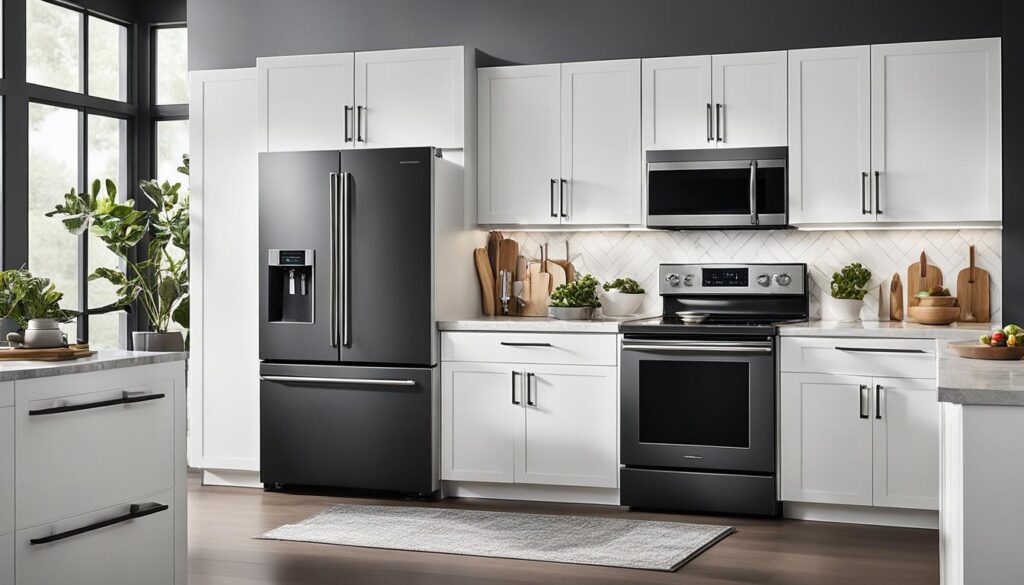
The future of energy efficiency is poised for remarkable advancements driven by technological innovations, sustainable practices, and evolving energy standards. As we look ahead, the integration of smart homes, energy management systems, and the Internet of Things (IoT) will revolutionize energy efficiency.
Smart homes equipped with energy management systems will enable homeowners to monitor and control their energy consumption more effectively. These systems will provide real-time data on energy usage, allowing users to identify areas for optimization and make informed decisions about energy-saving measures.
The Internet of Things (IoT) will play a pivotal role in connecting appliances and devices, creating a seamless network that maximizes energy efficiency. Connected appliances, such as smart refrigerators and air conditioning units, will communicate with each other, adjusting their settings based on real-time data and user preferences. This level of automation and coordination will minimize wasted energy and optimize overall efficiency.
Technological advancements will also drive the development of more sustainable practices and energy-efficient solutions. Building materials, for example, will become more energy-efficient and environmentally friendly, reducing the carbon footprint of buildings. Energy storage technologies will improve, enabling the effective use of renewable energy sources such as solar and wind power.
Moreover, evolving energy standards and regulations will push for greater energy efficiency across industries. Governments and organizations worldwide are continuously updating energy standards to promote the use of energy-efficient technologies and encourage sustainable practices. This commitment to improving efficiency will foster innovation and the development of more energy-efficient products and systems.
| Key Factors Shaping the Future of Energy Efficiency |
|---|
| Technological advancements |
| Smart homes and energy management systems |
| Internet of Things (IoT) integration |
| Sustainable practices and materials |
| Evolving energy standards and regulations |
The future of energy efficiency holds immense potential for creating a sustainable and energy-efficient world. By embracing technological advancements, smart homes, and sustainable practices, we can reduce energy waste, lower our carbon footprint, and build a more sustainable future.
Making the Switch to Energy Efficiency
Making the switch to energy efficiency involves adopting energy-saving habits and implementing behavioral changes. By making simple yet impactful changes in our daily lives, we can contribute to a more sustainable future and reduce our carbon footprint. Here are some energy-saving tips to help you get started:
- Turn off lights and unplug electronics when not in use: This simple habit can save a significant amount of energy and reduce your electricity bills. Remember to switch off lights when leaving a room and unplug chargers and devices that are not in use.
- Adjust thermostat settings: Lowering your thermostat by just a few degrees in winter and raising it in summer can make a noticeable difference in your energy consumption. Use a programmable or smart thermostat to automate temperature adjustments and optimize energy usage.
- Utilize natural light: Make the most of natural light during the day by opening curtains or blinds. Not only does this reduce the need for artificial lighting, but it also creates a pleasant ambiance in your home.
- Practice efficient laundry habits: Wash clothes in cold water whenever possible and only run full loads in your washing machine and dishwasher. Consider air-drying your clothes instead of using a dryer to save even more energy.
- Upgrade to energy-efficient appliances: When it’s time to replace your old appliances, choose energy-efficient options that are ENERGY STAR certified. They consume less energy and perform just as well, if not better, than their conventional counterparts.
To gain a better understanding of your home’s energy usage and identify areas for improvement, consider getting an energy audit conducted by professionals. Energy audits provide valuable insights and guidance on optimizing your household energy use, allowing you to make informed decisions regarding energy-efficient upgrades.
“Embracing energy efficiency contributes to a sustainable lifestyle.”
– [Author Name]
Switching to energy efficiency not only benefits the environment but also translates into long-term cost savings. By making conscious choices and adopting energy-saving habits, you can play a part in building a sustainable future while enjoying the financial rewards of reduced energy consumption. Start today and make a positive impact!
Conclusion
Investing in the best energy-efficient home appliances is not only a smart choice for enhancing convenience and efficiency but also a significant step towards supporting sustainability and cost savings. By choosing appliances that prioritize energy efficiency, individuals can make a positive impact on the environment and contribute to a cleaner, greener future.
Energy efficiency plays a crucial role in achieving a clean energy future. By reducing energy consumption and promoting the use of clean energy sources, we can mitigate the effects of climate change and reduce our carbon footprint. This shift towards clean energy and sustainable practices is essential for preserving our planet for future generations.
Furthermore, embracing energy efficiency also promotes energy justice for all communities. Access to energy-efficient appliances and clean energy technologies can help bridge the gap in providing equal opportunities for a sustainable lifestyle. By making informed choices, individuals can contribute to energy justice and build a more equitable and inclusive society.
As we look towards the future, the outlook for energy efficiency is promising. Technological advancements, such as smart homes and energy management systems, will continue to enhance energy efficiency and make it easier for individuals to adopt sustainable practices. With evolving energy standards and innovative solutions being developed, the future of energy efficiency holds great potential.
FAQ
What are the top energy-efficient home appliances for 2024?
The top-rated energy-efficient home appliances for 2024 include energy-efficient smart refrigerators, multi-functional air fryer ovens, high-efficiency washing machines, smart robotic vacuum cleaners, and voice-controlled smart ovens.
What features do energy-efficient smart refrigerators offer?
Energy-efficient smart refrigerators come with advanced features like adjustable temperature zones, remote monitoring, energy-saving modes, and smartphone app control. They help reduce your carbon footprint and cut down on energy bills.
What are the benefits of multi-functional air fryer ovens?
Multi-functional air fryer ovens offer a healthier alternative to traditional frying and can bake, grill, and dehydrate food. They save kitchen space, come with smart features like preset cooking programs, and are energy-efficient, using less electricity compared to conventional ovens.
What features do high-efficiency washing machines have?
High-efficiency washing machines focus on reducing water and energy use. They come with features like load-sensing technologies, steam cleaning, sanitization options, smart connectivity, and even self-dosing detergent systems for added efficiency and convenience.
What are the advantages of smart robotic vacuum cleaners?
Smart robotic vacuum cleaners not only vacuum but also mop floors, adapt to different surfaces, and have advanced navigation systems for efficient cleaning. They offer features like voice control, programmable schedules, and smart home compatibility for added convenience.
What features do voice-controlled smart ovens have?
Voice-controlled smart ovens can be controlled through voice commands or smartphone apps. They offer features like remote preheating, temperature control, cooking notifications, and some models even have built-in cameras for monitoring food without opening the oven door.
How can energy efficiency help save money?
Energy efficiency helps lower electricity costs. Upgrading to energy-efficient appliances like heat pumps and using energy-efficient lightbulbs can significantly reduce utility bills. Smart thermostats can save approximately 10% in annual energy costs, and air-source heat pumps can reduce heating and cooling electricity usage by nearly 65%.
How does energy efficiency contribute to saving the planet?
Energy efficiency plays a vital role in reducing carbon emissions and mitigating the impacts of climate change. It helps conserve natural resources, promote sustainable practices, and build a more sustainable future with lower emissions and a clean energy economy.
What is the Justice40 Initiative?
The Justice40 Initiative aims to direct at least 40% of the benefits from climate and clean energy investments to disadvantaged communities. This initiative promotes equity by creating jobs, revitalizing local economies, providing affordable and sustainable housing, and investing in critical infrastructure.
How does energy efficiency save money in the long run?
While there may be upfront costs, energy-efficient choices increase energy savings over time, resulting in long-term financial benefits. Energy-efficient upgrades such as heat pumps, energy-efficient lightbulbs, and smart thermostats are cost-effective in the end due to reduced energy consumption and lower utility bills.
What is the environmental impact of energy efficiency?
Energy efficiency plays a crucial role in reducing carbon emissions and mitigating climate change. It also helps conserve natural resources and promotes sustainable practices that contribute to a more environmentally friendly future powered by renewable energy sources.
How do governments promote energy efficiency?
Governments around the world promote energy efficiency through various initiatives, including energy efficiency programs, incentives such as tax credits, rebates, and grants, and the implementation of energy-efficient policies. Government support encourages individuals and businesses to adopt energy-efficient practices and invest in energy-efficient appliances.
What does the future of energy efficiency look like?
The future of energy efficiency is promising with continued technological advancements. Smart homes equipped with energy management systems and connected appliances through the Internet of Things (IoT) will enhance energy efficiency. Sustainable practices and evolving energy standards will drive innovation and further improve the energy efficiency of home appliances and systems.
How can I make the switch to energy efficiency?
Making the switch to energy efficiency involves adopting energy-saving habits and implementing behavioral changes. Simple actions like turning off lights when not in use, unplugging electronics, and adjusting thermostat settings can make a difference. Energy audits by professionals provide guidance on optimizing household energy use, and embracing energy efficiency contributes to a sustainable lifestyle.
How do energy-efficient home appliances benefit me?
Investing in the best energy-efficient home appliances enhances convenience, improves efficiency, and supports sustainability. Energy efficiency helps save money, promotes a clean energy future, and contributes to energy justice for all communities. By making informed choices and embracing energy-efficient practices, individuals can contribute to a greener, more sustainable world.



